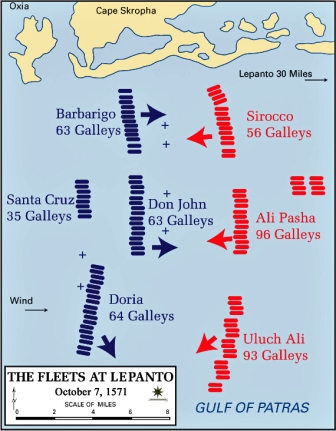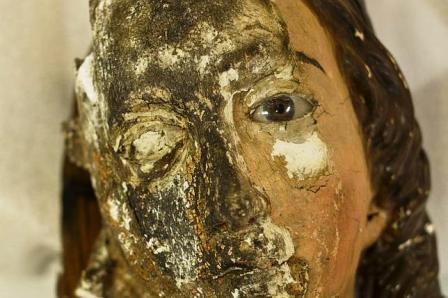The Battle of Lepanto on 7 October 1571 was the largest naval engagement until Jutland in 1916. 40,000 dead in 4 hours. There are many famous battles, but most of them come no where near the significance of Lepanto for the history of Western Civilization.

And Our Lady brought the victory.
Through the intercession of Our Lady of Victory by the praying of the Holy Rosary, Western Civilization was preserved. Thus, today is celebrated as the Feast of the Holy Rosary.
 Another miracle occurred that day. As the Battle raged, St. Pius V in Rome had a vision of the victory while he was visiting the headquarters of the Domincans on the Aventine Hill at Santa Sabina. The messenger bringing news of the victory would arrive a couple weeks later. You can visit the room where Pius received the message.
Another miracle occurred that day. As the Battle raged, St. Pius V in Rome had a vision of the victory while he was visiting the headquarters of the Domincans on the Aventine Hill at Santa Sabina. The messenger bringing news of the victory would arrive a couple weeks later. You can visit the room where Pius received the message.
Please pray the Rosary today. Please add a prayer for me.
Sometimes you hear of the travelling statue of Our Lady of Fatima. She was just here in Madison.
I would like to see another statue travel!
A few years ago, according to an article in Spanish at ABC, the original statue of Our Lady given by Venice to don Juan de Austria – that was on the quarterdeck of his flagship (more properly “lantern galley”) at Lepanto – was rediscovered and was restored at the Spanish Navy Museum.

I could kick myself. When I was in Madrid last spring, I walked by this Museum every day! We were staying nearby. Next time.
Finally, read GK Chesterton’s Lepanto. UK HERE
Also, Fr. Rutler has a good explanation of the context of the Battle of Lepanto at the valuable Crisis. HERE


































The divinumofficium.com entry for Matins on this Feast of the Holy Rosary includes the invitatory antiphon (in Latin and a 19th English translation)
Solemnitatem Rosarii Virginis Mariae celebremus: * . . . .
Let us keep the Feast of the Rose-garden of the Blessed Virgin Mary; * . . . .
Rose-garden? If we consult the incomparable Lewis & Short Latin Dictionary so hallowed by repeated WDTPRS reference, then we discover that the Latin word rosarii means “rose garden”!
Of course, this is no surprise to anyone who in a pre-Vatican II parochial school was taught by the sisters that “every Hail Mary is a rose for Our Lady” (who’s long been generally associated with roses). But how many post-Vatican II pew-sitters—even those (few?) that have the beads and pray the prayer daily—know the actual ( or, at least, the original) meaning of the word “rosary”?
Our entire school will be praying the Rosary together this afternoon. You’re on the list, Father!
All my life I had pronounced it li-PAHN-toh. I even had a friend who named one of his kids’ middle names (I believe he has five middle names) Lepanto and he pronounced it that way. But yesterday on Catholic Answers Live, Jimmy Aiken said li-PAN-toh and I looked it up and it appears that is the proper pronunciation. Any thoughts?
The Crisis article discloses that in 1965 Pope Paul VI returned the banner to the Turks in a “gesture of goodwill.” Speechless.
Conflict with the Muhammedan before Al Qaeda / ISIS? The TV tells us the problem is radical Islamic terrorists – not Islam. This is a battle between the Orthodox Muhammedan and the now secular (once Orthodox Christian) West.
Here is a pronouncement of Lepanto:
http://howjsay.com/pronunciation-of-lepanto
The Chicken
A magnificent piece by Fr Rutler. May our Lord continue to bless and keep him. Two standout quotes:
The Sultan knew that the Church had been weakened by the new Protestant schismatics,..
No doubt Fr Rutler made sure to point that out……
and this zinger which will go down as accurate, prophetic and quoted for centuries to come:
Like Cervantes, he [Don Juan] was only twenty-four years old, roughly the same age as some modern youth on our college campuses who demand “safe spaces” to shelter them from lecturers whose contradictions of their views make them cry.
Frankly, we are losing battles in this war because Muslim/Eastern parents are BETTER at teaching their young, compared with Western and Christian ones. Their not teaching them the most important truths of course, but they ARE better teachers. On this, Chesterton was bang on: “the pagans of old worshipped their ancestors, the modern pagans worship their descendants”.
Also, Christopher Check’s MAGNIFICENT 3-CD set titled “Lepanto”, and published by Catholic Answers, is a gold standard. It will keep you RIVETED (even though we know the blessed outcome), and the 3rd disc includes his reading of Chesterton’s sublime poem.
HERE
Father, thank you for this, with Fr. Rutler linked!
snoozie, thank you for the information! LibriVox.org has readings by an English and (in Chesterton’s Poems) an American volunteer – and YouTube seems to have an immense variety of readings of Chesterton’s Lepanto, for anyone who likes being read aloud to (and may want to browse around to discover a favorite performance).
Finally taking some time to read the background of the Battle of Lepanto, I see that, like the Greek naval victory over the Persians two millennia earlier at Salamis, the outcome was enabled by a major delaying action perhaps less lopsided, but even more significant than the famed battle of Thermopylae.
In the case of Lepanto, it was the siege of Famagusta in Cypress, which was the act of resistance that gave Pope Pius V time to assemble the Holy League.
For 11 months, 8500 Venetian soldiers in Famagusta held out against the siege by the continually growing Ottoman forces. Ultimately, 200,000 Turks participated in the siege. By the end, 5 major assaults had been repelled. In the final one they actually succeeded in breaching the walls, but were still repelled by the desperate efforts of the starving defenders.
At this point, out of supplies and having suffered 90% casualties, yet dealt over 5 times as many to their attackers, the Venetians finally asked for terms of surrender. The Muslim commander offered them safe passage out of Cypress. Shortly after the surrender was accepted, however, he changed his mind, slaughtered the residents of the city, and tortured the Venetian general to death.
The combination of a costly land campaign and a devastating naval defeat limited the Ottoman invasion to only taking Cypress. Lepanto definitely hurt the Ottomans worse strategically, but the defenders of Famagusta bore the worst of the war.
Both Salamis and Lepanto were naval battles fought in Greek waters to preserve the west against a seemingly unstoppable empire.
Both battles were witnessed by one of the leading writers of the age: Aeschylus at Salamis and Cervantes at Lepanto.
[Good catch about Aeschylus!]
Thing that needs to be done when Fr. Z becomes pope (after the total suppression/abolition of the Jesuits) — get that banner back.